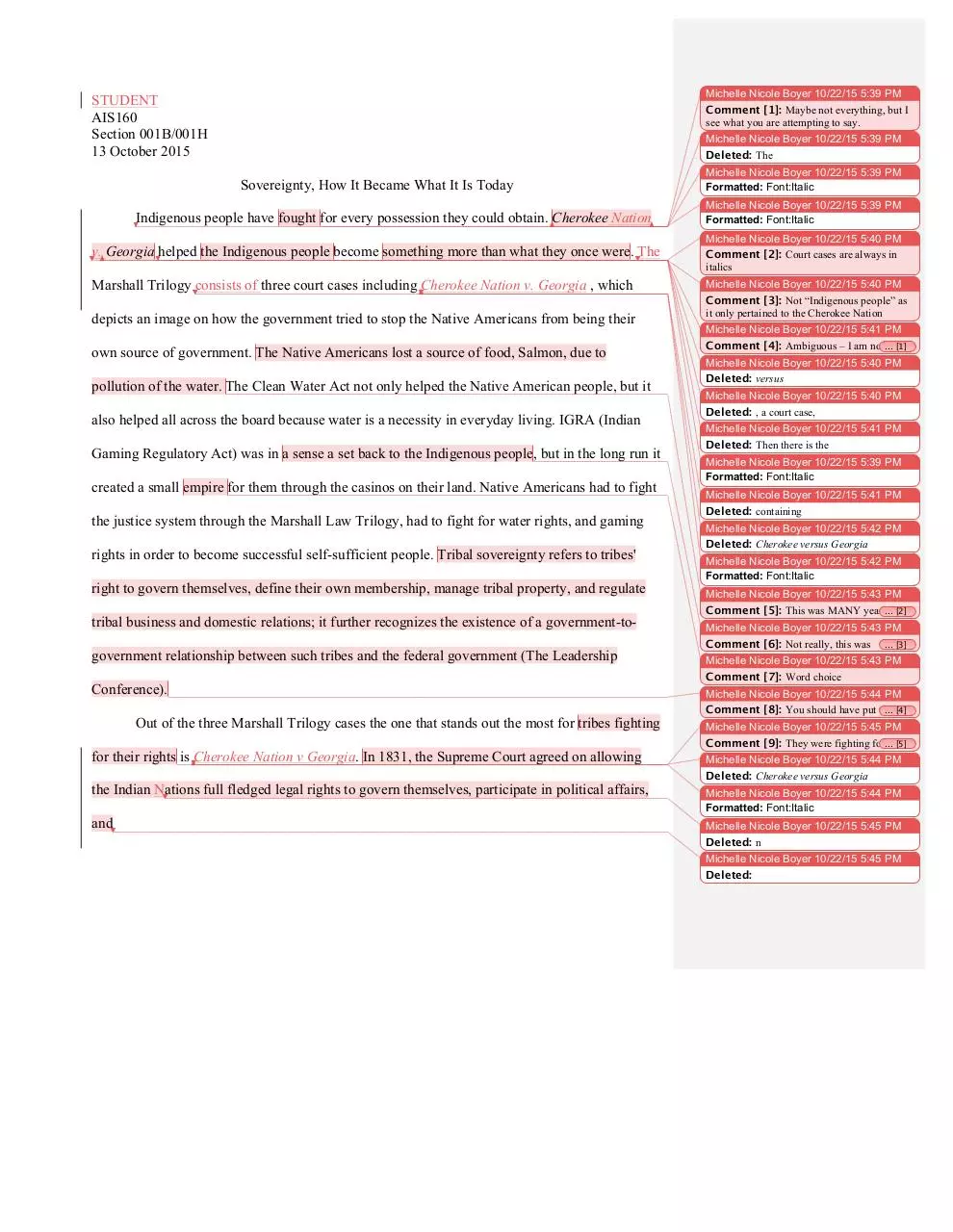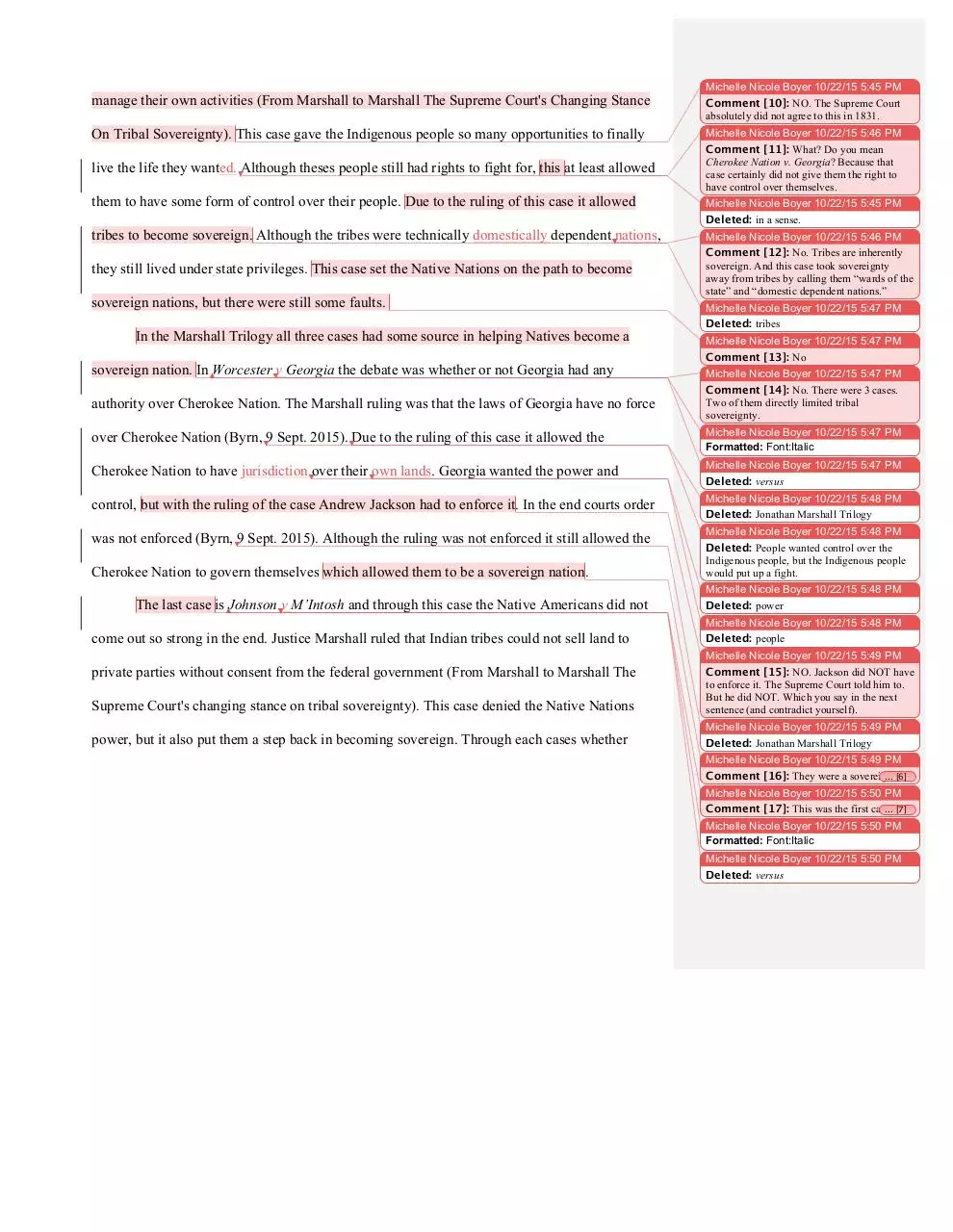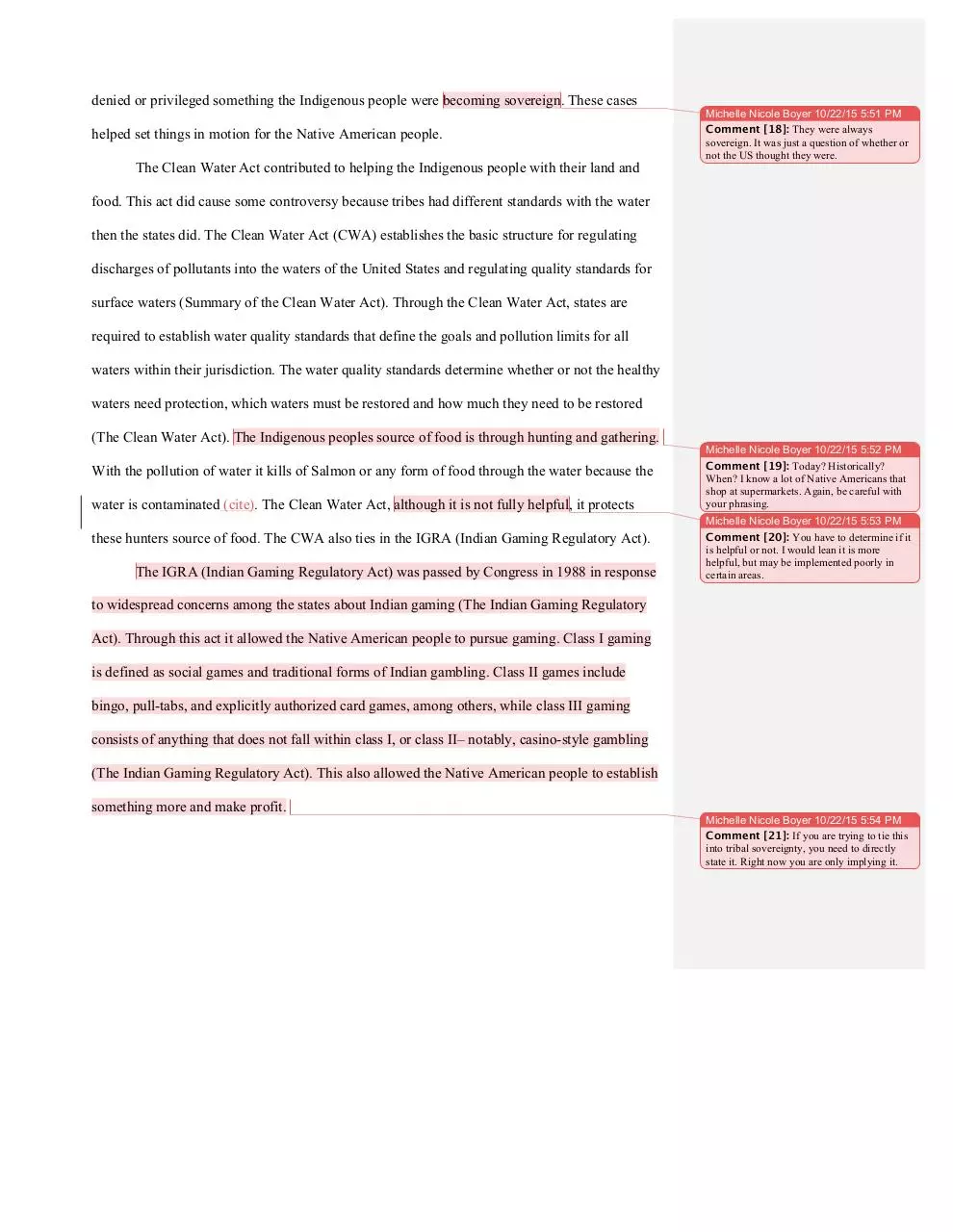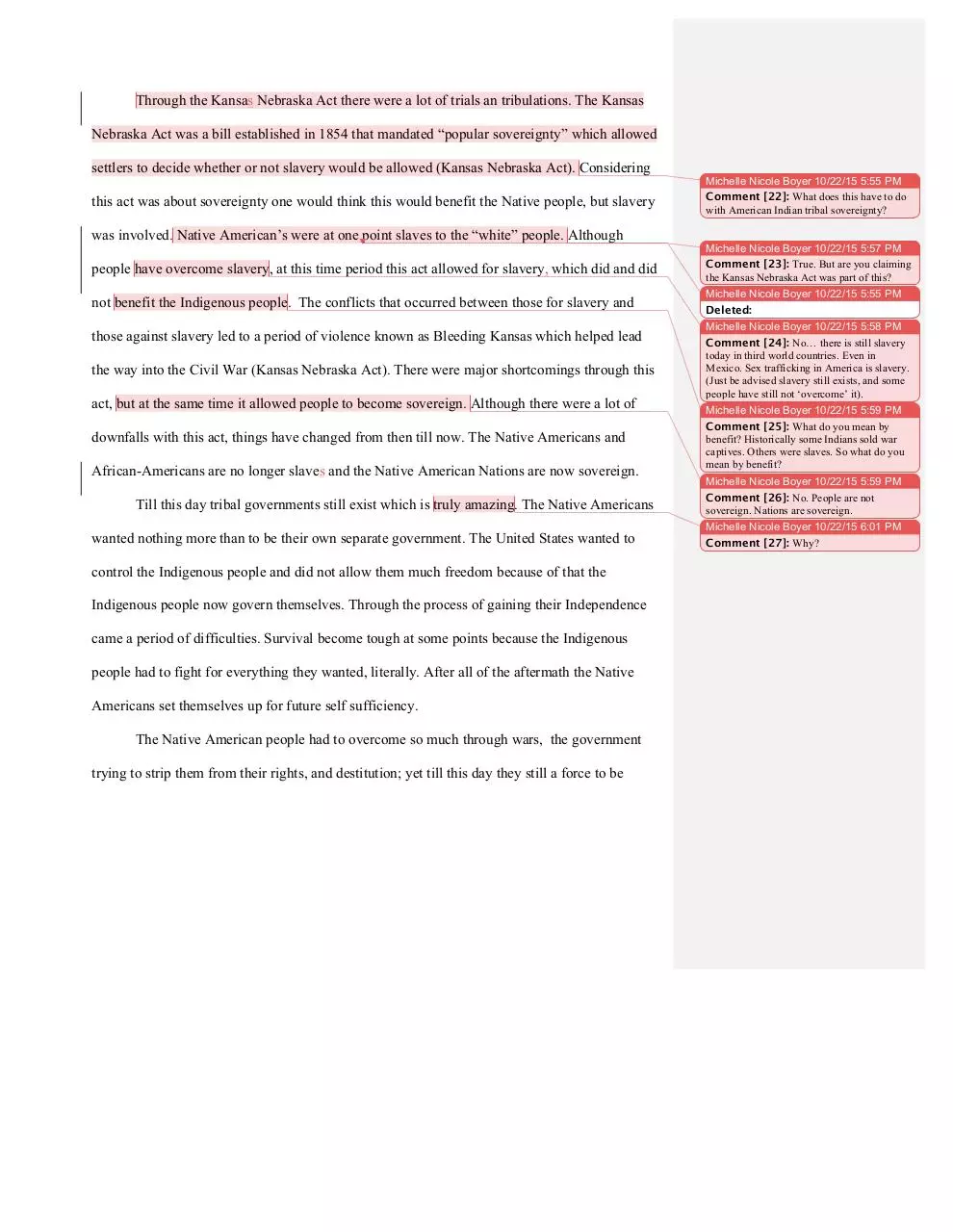GRADED3 (PDF)
File information
Title: Microsoft Word - Cox_Chloe_essay_graded1.docx
Author: Michelle Nicole Boyer
This PDF 1.3 document has been generated by Microsoft Word / Mac OS X 10.6.8 Quartz PDFContext, and has been sent on pdf-archive.com on 28/04/2016 at 08:20, from IP address 73.24.x.x.
The current document download page has been viewed 946 times.
File size: 236.07 KB (7 pages).
Privacy: public file





File preview
Michelle Nicole Boyer 10/22/15 5:39 PM
Comment [1]: Maybe not everything, but I
see what you are attempting to say.
STUDENT
AIS160
Section 001B/001H
13 October 2015
Michelle Nicole Boyer 10/22/15 5:39 PM
Deleted: The
Sovereignty, How It Became What It Is Today
Indigenous people have fought for every possession they could obtain. Cherokee Nation
v. Georgia helped the Indigenous people become something more than what they once were. The
Marshall Trilogy consists of three court cases including Cherokee Nation v. Georgia , which
depicts an image on how the government tried to stop the Native Americans from being their
own source of government. The Native Americans lost a source of food, Salmon, due to
pollution of the water. The Clean Water Act not only helped the Native American people, but it
also helped all across the board because water is a necessity in everyday living. IGRA (Indian
Gaming Regulatory Act) was in a sense a set back to the Indigenous people, but in the long run it
created a small empire for them through the casinos on their land. Native Americans had to fight
the justice system through the Marshall Law Trilogy, had to fight for water rights, and gaming
rights in order to become successful self-sufficient people. Tribal sovereignty refers to tribes'
right to govern themselves, define their own membership, manage tribal property, and regulate
tribal business and domestic relations; it further recognizes the existence of a government-togovernment relationship between such tribes and the federal government (The Leadership
Conference).
Out of the three Marshall Trilogy cases the one that stands out the most for tribes fighting
for their rights is Cherokee Nation v Georgia. In 1831, the Supreme Court agreed on allowing
the Indian Nations full fledged legal rights to govern themselves, participate in political affairs,
and
Michelle Nicole Boyer 10/22/15 5:39 PM
Formatted: Font:Italic
Michelle Nicole Boyer 10/22/15 5:39 PM
Formatted: Font:Italic
Michelle Nicole Boyer 10/22/15 5:40 PM
Comment [2]: Court cases are always in
italics
Michelle Nicole Boyer 10/22/15 5:40 PM
Comment [3]: Not “Indigenous people” as
it only pertained to the Cherokee Nation
Michelle Nicole Boyer 10/22/15 5:41 PM
Comment [4]: Ambiguous – I am not ...
sure
[1]
Michelle Nicole Boyer 10/22/15 5:40 PM
Deleted: versus
Michelle Nicole Boyer 10/22/15 5:40 PM
Deleted: , a court case,
Michelle Nicole Boyer 10/22/15 5:41 PM
Deleted: Then there is the
Michelle Nicole Boyer 10/22/15 5:39 PM
Formatted: Font:Italic
Michelle Nicole Boyer 10/22/15 5:41 PM
Deleted: containing
Michelle Nicole Boyer 10/22/15 5:42 PM
Deleted: Cherokee versus Georgia
Michelle Nicole Boyer 10/22/15 5:42 PM
Formatted: Font:Italic
Michelle Nicole Boyer 10/22/15 5:43 PM
Comment [5]: This was MANY years...after
[2]
Michelle Nicole Boyer 10/22/15 5:43 PM
Comment [6]: Not really, this was ... [3]
Michelle Nicole Boyer 10/22/15 5:43 PM
Comment [7]: Word choice
Michelle Nicole Boyer 10/22/15 5:44 PM
Comment [8]: You should have put the
... [4]
Michelle Nicole Boyer 10/22/15 5:45 PM
Comment [9]: They were fighting for...their
[5]
Michelle Nicole Boyer 10/22/15 5:44 PM
Deleted: Cherokee versus Georgia
Michelle Nicole Boyer 10/22/15 5:44 PM
Formatted: Font:Italic
Michelle Nicole Boyer 10/22/15 5:45 PM
Deleted: n
Michelle Nicole Boyer 10/22/15 5:45 PM
Deleted:
manage their own activities (From Marshall to Marshall The Supreme Court's Changing Stance
On Tribal Sovereignty). This case gave the Indigenous people so many opportunities to finally
live the life they wanted. Although theses people still had rights to fight for, this at least allowed
Michelle Nicole Boyer 10/22/15 5:45 PM
Comment [10]: NO. The Supreme Court
absolutely did not agree to this in 1831.
Michelle Nicole Boyer 10/22/15 5:46 PM
Comment [11]: What? Do you mean
Cherokee Nation v. Georgia? Because that
case certainly did not give them the right to
have control over themselves.
them to have some form of control over their people. Due to the ruling of this case it allowed
Michelle Nicole Boyer 10/22/15 5:45 PM
Deleted: in a sense.
tribes to become sovereign. Although the tribes were technically domestically dependent nations,
Michelle Nicole Boyer 10/22/15 5:46 PM
Comment [12]: No. Tribes are inherently
sovereign. And this case took sovereignty
away from tribes by calling them “wards of the
state” and “domestic dependent nations.”
they still lived under state privileges. This case set the Native Nations on the path to become
sovereign nations, but there were still some faults.
In the Marshall Trilogy all three cases had some source in helping Natives become a
sovereign nation. In Worcester v Georgia the debate was whether or not Georgia had any
authority over Cherokee Nation. The Marshall ruling was that the laws of Georgia have no force
Michelle Nicole Boyer 10/22/15 5:47 PM
Deleted: tribes
Michelle Nicole Boyer 10/22/15 5:47 PM
Comment [13]: No
Michelle Nicole Boyer 10/22/15 5:47 PM
Comment [14]: No. There were 3 cases.
Two of them directly limited tribal
sovereignty.
over Cherokee Nation (Byrn, 9 Sept. 2015). Due to the ruling of this case it allowed the
Michelle Nicole Boyer 10/22/15 5:47 PM
Formatted: Font:Italic
Cherokee Nation to have jurisdiction over their own lands. Georgia wanted the power and
Michelle Nicole Boyer 10/22/15 5:47 PM
Deleted: versus
control, but with the ruling of the case Andrew Jackson had to enforce it. In the end courts order
Michelle Nicole Boyer 10/22/15 5:48 PM
Deleted: Jonathan Marshall Trilogy
was not enforced (Byrn, 9 Sept. 2015). Although the ruling was not enforced it still allowed the
Michelle Nicole Boyer 10/22/15 5:48 PM
Deleted: People wanted control over the
Indigenous people, but the Indigenous people
would put up a fight.
Cherokee Nation to govern themselves which allowed them to be a sovereign nation.
The last case is Johnson v M’Intosh and through this case the Native Americans did not
come out so strong in the end. Justice Marshall ruled that Indian tribes could not sell land to
Michelle Nicole Boyer 10/22/15 5:48 PM
Deleted: power
Michelle Nicole Boyer 10/22/15 5:48 PM
Deleted: people
Supreme Court's changing stance on tribal sovereignty). This case denied the Native Nations
Michelle Nicole Boyer 10/22/15 5:49 PM
Comment [15]: NO. Jackson did NOT have
to enforce it. The Supreme Court told him to.
But he did NOT. Which you say in the next
sentence (and contradict yourself).
power, but it also put them a step back in becoming sovereign. Through each cases whether
Michelle Nicole Boyer 10/22/15 5:49 PM
Deleted: Jonathan Marshall Trilogy
private parties without consent from the federal government (From Marshall to Marshall The
Michelle Nicole Boyer 10/22/15 5:49 PM
Comment [16]: They were a sovereign
... [6]
Michelle Nicole Boyer 10/22/15 5:50 PM
Comment [17]: This was the first case...the
[7]
Michelle Nicole Boyer 10/22/15 5:50 PM
Formatted: Font:Italic
Michelle Nicole Boyer 10/22/15 5:50 PM
Deleted: versus
denied or privileged something the Indigenous people were becoming sovereign. These cases
helped set things in motion for the Native American people.
The Clean Water Act contributed to helping the Indigenous people with their land and
Michelle Nicole Boyer 10/22/15 5:51 PM
Comment [18]: They were always
sovereign. It was just a question of whether or
not the US thought they were.
food. This act did cause some controversy because tribes had different standards with the water
then the states did. The Clean Water Act (CWA) establishes the basic structure for regulating
discharges of pollutants into the waters of the United States and regulating quality standards for
surface waters (Summary of the Clean Water Act). Through the Clean Water Act, states are
required to establish water quality standards that define the goals and pollution limits for all
waters within their jurisdiction. The water quality standards determine whether or not the healthy
waters need protection, which waters must be restored and how much they need to be restored
(The Clean Water Act). The Indigenous peoples source of food is through hunting and gathering.
With the pollution of water it kills of Salmon or any form of food through the water because the
water is contaminated (cite). The Clean Water Act, although it is not fully helpful, it protects
these hunters source of food. The CWA also ties in the IGRA (Indian Gaming Regulatory Act).
The IGRA (Indian Gaming Regulatory Act) was passed by Congress in 1988 in response
Michelle Nicole Boyer 10/22/15 5:52 PM
Comment [19]: Today? Historically?
When? I know a lot of Native Americans that
shop at supermarkets. Again, be careful with
your phrasing.
Michelle Nicole Boyer 10/22/15 5:53 PM
Comment [20]: You have to determine if it
is helpful or not. I would lean it is more
helpful, but may be implemented poorly in
certain areas.
to widespread concerns among the states about Indian gaming (The Indian Gaming Regulatory
Act). Through this act it allowed the Native American people to pursue gaming. Class I gaming
is defined as social games and traditional forms of Indian gambling. Class II games include
bingo, pull-tabs, and explicitly authorized card games, among others, while class III gaming
consists of anything that does not fall within class I, or class II– notably, casino-style gambling
(The Indian Gaming Regulatory Act). This also allowed the Native American people to establish
something more and make profit.
Michelle Nicole Boyer 10/22/15 5:54 PM
Comment [21]: If you are trying to tie this
into tribal sovereignty, you need to directly
state it. Right now you are only implying it.
Through the Kansas Nebraska Act there were a lot of trials an tribulations. The Kansas
Nebraska Act was a bill established in 1854 that mandated “popular sovereignty” which allowed
settlers to decide whether or not slavery would be allowed (Kansas Nebraska Act). Considering
this act was about sovereignty one would think this would benefit the Native people, but slavery
was involved. Native American’s were at one point slaves to the “white” people. Although
people have overcome slavery, at this time period this act allowed for slavery, which did and did
not benefit the Indigenous people. The conflicts that occurred between those for slavery and
those against slavery led to a period of violence known as Bleeding Kansas which helped lead
the way into the Civil War (Kansas Nebraska Act). There were major shortcomings through this
act, but at the same time it allowed people to become sovereign. Although there were a lot of
downfalls with this act, things have changed from then till now. The Native Americans and
African-Americans are no longer slaves and the Native American Nations are now sovereign.
Till this day tribal governments still exist which is truly amazing. The Native Americans
wanted nothing more than to be their own separate government. The United States wanted to
control the Indigenous people and did not allow them much freedom because of that the
Indigenous people now govern themselves. Through the process of gaining their Independence
came a period of difficulties. Survival become tough at some points because the Indigenous
people had to fight for everything they wanted, literally. After all of the aftermath the Native
Americans set themselves up for future self sufficiency.
The Native American people had to overcome so much through wars, the government
trying to strip them from their rights, and destitution; yet till this day they still a force to be
Michelle Nicole Boyer 10/22/15 5:55 PM
Comment [22]: What does this have to do
with American Indian tribal sovereignty?
Michelle Nicole Boyer 10/22/15 5:57 PM
Comment [23]: True. But are you claiming
the Kansas Nebraska Act was part of this?
Michelle Nicole Boyer 10/22/15 5:55 PM
Deleted:
Michelle Nicole Boyer 10/22/15 5:58 PM
Comment [24]: No… there is still slavery
today in third world countries. Even in
Mexico. Sex trafficking in America is slavery.
(Just be advised slavery still exists, and some
people have still not ‘overcome’ it).
Michelle Nicole Boyer 10/22/15 5:59 PM
Comment [25]: What do you mean by
benefit? Historically some Indians sold war
captives. Others were slaves. So what do you
mean by benefit?
Michelle Nicole Boyer 10/22/15 5:59 PM
Comment [26]: No. People are not
sovereign. Nations are sovereign.
Michelle Nicole Boyer 10/22/15 6:01 PM
Comment [27]: Why?
reckoned with. Each case/act allowed the Indigenous people to gain just a little bit more than
they had before. Even though there were many trials, tribulations, and deaths, the Indigenous
people overcame everything thrown their way. Now Native Americans are a strong force and
continue to remain a strong force. Looking back at past events, would you be able to be strong
enough to fight for your rights in order to become a sovereign nation?
Michelle Nicole Boyer 10/22/15 6:04 PM
Comment [28]: Not every one
STUDENT,
There are some really interesting aspects to your essay. I think your contemporary issues are
interesting, but they distract from the overall focus of this essay: which was supposed to be the
affects of different historical cases and acts upon Native American sovereignty. Looking past
that, the information that you provided on the Marshall Trilogy that you provided is not entirely
correct and has some errors –which detracts from your argument. In some places, you seem to be
wary about tribal sovereignty in general. Tribes always had sovereignty, but there were times
when the US government attempted to limit it (Marshall Trilogy, two of the three cases are good
examples).
There were also 10 points deducted for the paper being turned in late.
For the next upcoming research paper, I would suggest you work on a rough draft so that maybe
we can work together on solving some of these issues if they come up again.
Please let me know if you have any questions.
60/100
Michelle Nicole Boyer 4/27/16 11:19 PM
Deleted:
... [8]
Cox-3
Michelle Nicole Boyer 4/27/16 11:19 PM
Deleted:
... [9]
Download GRADED3
GRADED3.pdf (PDF, 236.07 KB)
Download PDF
Share this file on social networks
Link to this page
Permanent link
Use the permanent link to the download page to share your document on Facebook, Twitter, LinkedIn, or directly with a contact by e-Mail, Messenger, Whatsapp, Line..
Short link
Use the short link to share your document on Twitter or by text message (SMS)
HTML Code
Copy the following HTML code to share your document on a Website or Blog
QR Code to this page

This file has been shared publicly by a user of PDF Archive.
Document ID: 0000366186.